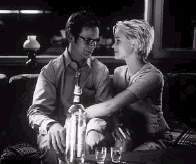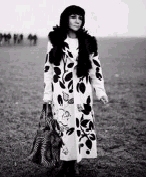Last year's Berlinale was notable for the strength and variety of its Neue deutsche Filme section. This, combined with the festival's brand spanking new premises on Potsdamer Platz and the fact that it was the festival's golden jubilee, created an enormous wave of optimism—not just about the festival but about the state of German film-making generally.
All this meant that this year's Berlinale was met with even more eager anticipation than it usually was. However, this year's selection of Neue deutsche Filme was something of a damp squib, even when you remove it from comparison with the tear-away success of last year's.
Of the films selected, four main directions were in evidence:
1. Some directors are making Hollywood-style comedies: so inconsequential, you've forgotten them the second the credits start to roll. Liebesluder (A Bundle of Joy,
 |
| Liebesluder : Not much to it |
2000) by Detlev W Buck is just one of numerous examples in this style of film-making, while simply the title of Edward Berger's
Frau2 sucht Happy End (
Female2 Seeks Happy End, 2000) is enough to put off anyone bar the most avid of Mills and Boon readers.
2. There were period dramas such as Gripsholm (2000) about the writer Kurt Tucholsky, who decided to leave a Berlin increasingly overrun by the National Socialists in the 1930s. This was a golden opportunity to show the torture of leaving the homeland for reasons of self-preservation and ideological disagreement. Instead, the film focuses on banal titillation and superficial characterisations.
3. Also in evidence was the usual fare of angst-ridden Teutonic characters from teenagers L'Amour, L'Argent, L'Amour (2000) by Philip Gröning and
 |
Die Unberührbare:
Yet more angst |
Die Innere Sicherheit (
The State I Am In, 2000) by Christian Petzold to old women
Die Unberührbare (
No Place To Go, 2000) by Oskar Roehler, all three films have been highly praised by the German press. Although
Die Innere Sicherheit can at least say that its story line is original,
L'Amour, L'Argent, L'Amour is repetitious and boring, and whilst
Die Unberuehrbare has received the greatest plaudits, quite frankly it would have been better as a twenty-minute short. It is what people expect of German film: black and white, slow, lacking in plot and depressing: all of which are to my mind old-fashioned and predictable—yet another film about a disorientated, boozy, old writer, who has lost her ideology and her publishing deal.
4. And finally, documentaries, which made up over a quarter of the Neue deutsche Filme section this year. While they are acceptable as a form of film-making on their own and no doubt worthy of acclaim, they are not feature films.
So was this uninspiring selection of films the fault of the selection panel or of German directors for not coming up with the goods? An indication that the
former might be the case was that two of the best German films playing during the festival were not even part of the official
Neue deutsche Filme selection.
Lost Killers (2000) by Dito Tsintsadze was shown at a one-off special screening and Hans Weingartner's
Das Weisse Rauschen (2000) could only be seen by press and distributors at a special European film market screening. What, one has to ask, was the panel playing at?







